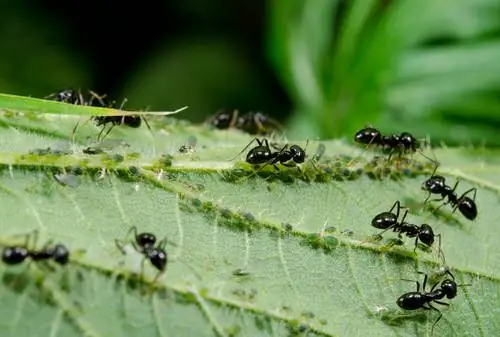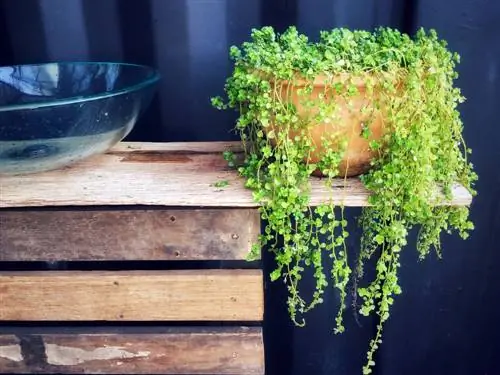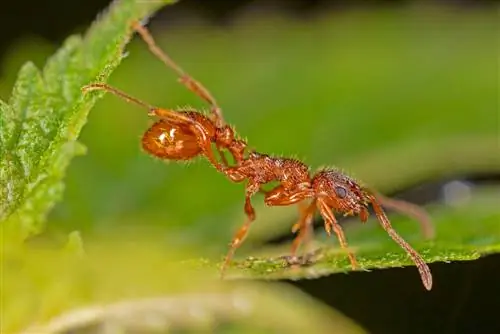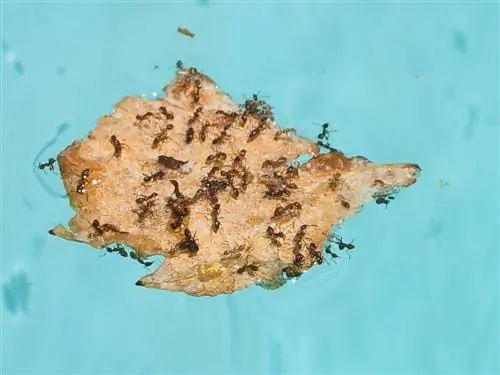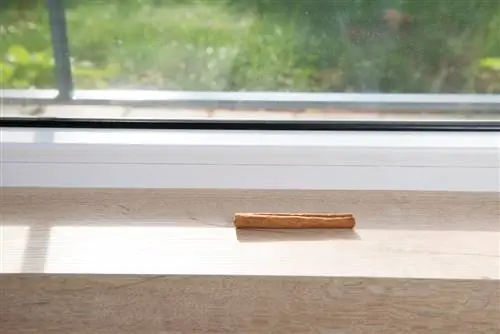- Author admin leonars@hobbygardeners.com.
- Public 2024-01-15 08:07.
- Last modified 2025-06-01 06:02.
Basically unproblematic, ants can become a real pest in the house and garden. This is especially true when you make yourself comfortable in the kitchen or under the terrace or feed the aphids in the flowerbed.
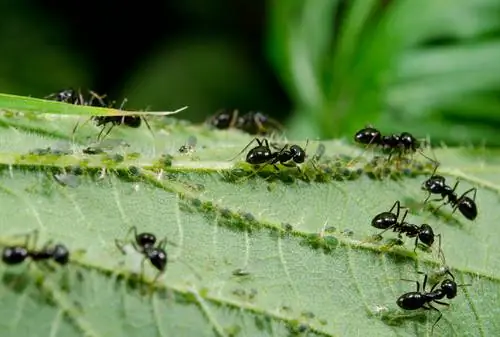
The best home remedies for ants - and which ones you can safely forget about
Old home remedies that are said to be particularly effective and quick in combating ants are always circulating on the Internet and in various gardening magazines. In fact, many of these tips are practically useless because the remedies have little or no effect. In this section we have clearly shown you which home remedies actually help and which you can safely forget.
Baking powder / baking yeast
The “insider tip” of fighting ants with a mixture of baking powder and powdered sugar is not a secret at all, but is actually ancient and probably dates back to the 19th century. Nowadays, however, the method no longer works because modern baking agents usually no longer contain baking soda - this substance is actually the effective one. In fact, the baking soda and powdered sugar mixture is a very effective home remedy, but we still advise against using it. Baking soda kills the animals in a painful way by making them bloat.
Beer
What works against snails can also be good against ants. In fact, the animals wander purposefully into a beer trap that has been set up, as do the voracious slugs, catching two birds with one trap. However, the animals also die here and the cause of the ant infestation - the nest - is also still there.
Vinegar
However, it is much more effective to spray ant streets and the ant nest - you can find this by simply following the road - with a mixture of vinegar and water. If you repeat this process more often and at short intervals, the creepy crawlies will quickly find a new, less trouble-prone home.
Cucumber
This “home remedy” can easily be relegated to the realm of fairy tales, as cucumber slices in the middle of the ant trail may briefly irritate the animals, but in no way hinder them in their actions.
Coffee
Coffee powder scattered on the ant trail only disturbs the little animals for a short time and they soon look for a new route.
Chalk / Baby Powder
Chalk and baby or talcum powder also only help in the short term to disrupt an ant trail or keep an outdoor picnic area free of hungry crawlers. Sprinkled powder or a chalk line will keep ants away from the coffee table on the patio table for a short time, but are not suitable for effective control of an infestation.
Copper
The same applies to laid out copper coins or wires, which only briefly disturb ant trails. However, the animals quickly find new ways.
Strong scents
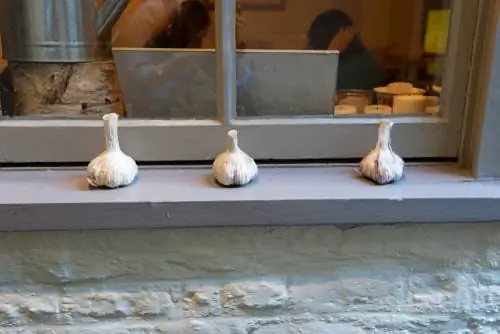
Garlic keeps ants and other unwanted guests away
The situation is different with strong-smelling plants that, when planted in beds heavily frequented by ants, effectively keep the animals away. However, you can use essential oils indoors or hang bouquets of herbs in the kitchen. However, keep in mind that all of these scents are also quite intense for humans and you have to like them in the house permanently. For short-term use, for example to drive away ants on their way into the house, you can also apply a decoction drop by drop or mop the floor with a citrus-based product.
- Garlic: not only works against ants, but also against many other pests
- Lavender: dried or fresh lavender is not particularly popular with ants
- Marjoram: perfect for planting in the garden
- Peppermint: a large peppermint bush on the balcony or terrace keeps ants away
- Tea tree oil: spread on window sills and door frames, the product is quite effective, but not for everyone due to its pungent smell
- Thyme: can be easily cultivated in pots and thus protects the balcony and terrace
- Cinnamon: a bowl of cinnamon bark on the windowsill smells pleasant to people and keeps creepy crawlies away
- Lemon: perfect for use in the house due to its pleasant smell, especially use fresh juice and grated peel
Vacuum cleaner
If the crawling is too much for you, you can also grab a vacuum cleaner and simply suck the ants away. The method actually helps, but only in the short term. After vacuuming, immediately remove the bag with the household waste, otherwise the ants will crawl out again and simply make themselves comfortable in another corner of the room. Bagless vacuum cleaners, on the other hand, should be cleaned carefully immediately after use.

Why grandma's home remedies don't help in the long term
All of the home remedies listed here have one glaring flaw: they work most of the time, but only for a very short time. As a rule, the ants are back in no time because the essential oils etc. only eliminate the symptoms, but not the causes. To do this, it is necessary to eliminate possible food sources as well as popular nesting places - and also to locate the ant nest. You can also easily relocate the animals without killing them.
Locate and eliminate ant nests
The ant nest is usually quite easy to find by retracing the path of the creepy crawlies on the ant trail. In most cases this is outside the house. Now you have different options:
Flowerpot:Fill a flowerpot with wood shavings and place it over the ant nest with the open side down. Now wait a few days; the animals usually move there with their larvae and you can put the pot back in a safe place.
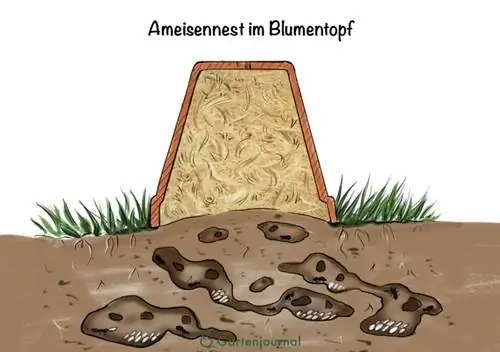
Water: If relocating the animals doesn't work as hoped, you can simply flood the nest with water. If you keep pouring water in, the ants will eventually move. The disadvantage of this method, however, is that you have no influence on the new nest location. In addition, many of the animals drown.
How to prevent ant infestation
Ants have an extremely good sense of smell, which shows the animals the sweet food they are looking for from long distances. When they migrate, they react strongly to appropriate stimuli, which is why you can counteract an ant invasion in advance by following easy-to-implement rules of behavior. Furthermore, when creating terraces and other structural features, it is important not to provide the animals with any incentives to build a nest.
Prevention is better than fighting.
Ants in the house and apartment
If ants have already created real ant trails in the house or on the balcony, they have found a worthwhile source of food here. The nest is not always located directly on site; instead, the animals have found a loophole somewhere and can get in and out from there at will. Now it's best to proceed as follows:
- Seal loopholes: Locate wall openings and joints and seal them well using suitable means. Particularly inspect door and window openings.
- Cleanliness and order: Ants are primarily attracted by open fruit, used pet food bowls and other sources. Do not store fruits and pet food open and clean the bowls immediately after use. Do not leave any used dishes behind, but wash them straight away. The same applies to leftover food that has fallen on the floor.
- Do not store food openly: It is also best to store food supplies in airtight containers. This also applies to food stored in the refrigerator, as even refrigerator seals are no obstacle for ants.
- Garbage: Dispose of biological waste in particular only in containers that can be sealed and dispose of it outside every day - by the way, in lockable garbage cans here too.
Ants in the garden
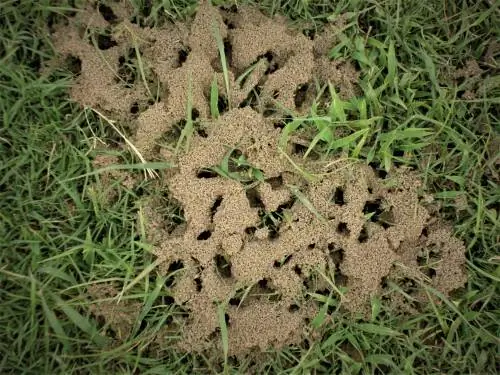
Ants are difficult to keep out of the garden
Ant infestation in the garden, however, is difficult to prevent, after all, the animals find hiding places and food in abundance here: ripe fruit on trees and bushes, sweet strawberries in the garden bed, aphids on roses and other plants, loose paving slabs a sandy surface etc.- all of this offers perfect conditions for the little crawlers. However, you also have some options here:
- Do not lay paving slabs on sand, but rather on coarse gravel
- Seal joints well
- Store compost in a container that can also be easily closed
- Seal garbage cans odor-tight
- Immediately combat any infestation of leaf sap-sucking pests
- Plant odor-intensive herbs such as marjoram, chervil, lemon balm, peppermint etc. in vulnerable areas
Tip
It can also help to target predators and ensure that they feel comfortable in your home garden. The various species of woodpeckers, for example, are excellent ant eaters, but spiders, millipedes, some predatory beetles and amphibians such as frogs also like to eat the little crawlers.
What helps against ants and aphids?
A noticeable ant infestation in the garden is often due to aphids. Here you first have to eliminate the cause - namely the aphids - otherwise the ants will keep coming back. The sweet honeydew is just too tempting for that. So fight the aphids by spraying the infected plants several times with a decoction of garlic, onions or nettles. Alternatively, concentrated black tea or a vinegar-water mixture with a splash of detergent also work. Ladybugs and other beneficial insects, on the other hand, only work if you drive away the ants first.
Ants in the lawn
The yellow ants in particular feel very comfortable in the lawn and build small, hill-shaped nests here. These are mainly found in bare, sparsely vegetated areas in sunny locations and on sandy soil. An infestation can be prevented very well by caring for the lawn carefully and keeping the turf as dense as possible. Regular liming is particularly effective against ants.
Ants on the terrace
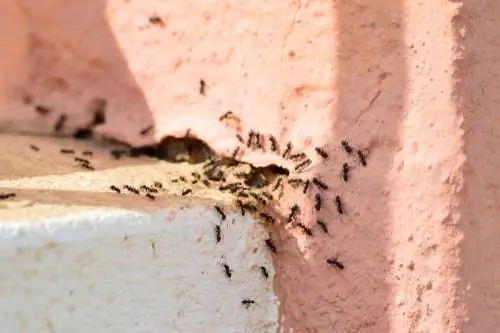
Sun-warmed terraces are the perfect place for an ant nest
Terraces in the warm sun are particularly popular with ants because the rays quickly heat up the surface and the nest underneath is always nice and warm and provides ideal breeding conditions. However, an infestation that is difficult to combat can be prevented when building the terrace by using coarse gravel or fine chippings instead of sand for the subsurface. The animals cannot clear away this material like sand and therefore have little incentive to build a nest.
Use insecticides only in exceptional cases
Insecticides or bait traps that are intended to curb the ant plague are available in drugstores and gardening stores. Avoid these toxic and polluting agents, especially if you have to use them indoors. Ant bait usually contains an attractant - for example spinosad - which the animals carry into the nest, feed their offspring with and from which the entire colony ultimately dies. The flooding of the nest is also quite brutal, but many animals still survive - and as we all know, water is not poisonous.
Useful helpers in the garden
In fact, ants are known to be annoying, but they are certainly useful animals. The little crawlers loosen the soil in the flower and vegetable bed through their digging activities, ensuring that it does not solidify and that oxygen exchange works. You don't have to worry that the roots of the plants will also be loosened and damaged. This is usually not the case.
Ants as pest controllers
Insects are also among the most effective pest controllers, with numerous herbivorous caterpillars, larvae, beetles, etc. on their menu. A colony of protected red wood ants (Formica rufa) destroys up to 100,000 of these garden pests - every day. The ants that often appear in gardens are also hard-working pest controllers.
In particular, the black or black-gray garden ant, also known as the garden ant, is predatory and preys on various other insect species.
When is an ant infestation problematic?
However, the same species is also problematic because it has practically perfected the keeping of aphids. In addition, the black ants not only feed on the honeydew of aphids, but also make do with other plant sap-sucking pest insects such as scale insects, cicadas or psyllids.
Ants and Aphids
The black ant practically keeps these as pets, cares for and maintains the respective colonies, defends them against attacks and, if necessary, even relocates them to other plants - perhaps closer to the burrow. In general, ants love everything sweet and like to go into houses and apartments to look for food - and sometimes even reach the fifth floor of an apartment building.
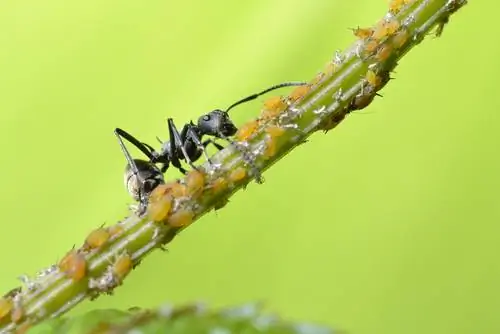
The black wood ant keeps aphids as pets
Ants as storage pests
An ant infestation in the kitchen or another room is not only annoying, but also problematic from a hygienic point of view. The little animals not only pounce on open fruit bowls or unsealed supplies, but also transmit bacteria and other pathogens. For this reason, you should always throw away infected food.
Other species, however, cause problems because they like to build their ant nests under sunny terraces and erode the sandy foundation there over time. There is a risk that the terrace will collapse at some point.
Common species in the garden
There are around 200 different species of ants in Europe, of course not all of which live in your home garden. Here it is mainly the yellow and black ants that feel comfortable in the beds and lawn. While the yellow ant mainly builds mole-like nesting mounds in lawns - and are often covered in grass - and is otherwise hardly visible, the black ant creates real ant trails and is quite active. The aforementioned red wood ant also occasionally gets lost in gardens. This is a protected species that must not be disturbed or killed.
| Art | Latin name | Appearance | Occurrences | Problem | Special features |
|---|---|---|---|---|---|
| Red-backed House Ant | Lasius brunneus | up to four millimeters in size, bicolor with yellowish-brown to red back and darker body | in the house and outdoors | Wood pest, hygiene pest | builds nests in wood (e.g. under stairs, in floorboards), under wall paneling and under plaster |
| Common Lawn Ant | Tetramorium caespitum | up to three millimeters long, dark brown to black in color | in the house and outdoors | Hygiene pest | likes to build nests in grass, under wood, stones or even foundations |
| Pharaoh ants | Monomorium pharaonis | about two millimeters tall, yellowish color with darker abdomen | mainly in houses, also in hospitals, swimming pools, kitchens etc., prefer a warm, humid climate | very large colonies with up to 300,000 animals, looking for protein-rich food | difficult to fight, build new nests quickly |
| Black-gray garden ant | Lasius niger | up to five millimeters in size, dark brown to black | mainly outside, but also inside the house | always looking for sugary food, creating busy streets | mainly build nests in the ground, under paving stones etc. |
| Yellow meadow ant | Lasius flavus | up to 4.5 millimeters long, yellow to brown-yellow | mainly in gardens and meadows / in the lawn | rarely leave the nest because they keep root lice in the burrow for honeydew production | creates earth nests under stones or builds anthills |
Flying ants
People who have flying ants in their home for the first time are often frightened. Although the animals appear much larger than the normally small crawlers and often appear in large swarms, they are completely harmless. In fact, they are completely normal ants that are just on their nuptial flight and are in no way making any attempt to conquer your home.
The animals willing to mate are usually out and about at dusk and are attracted by light sources. For this reason, the winged ants suddenly find themselves in the living room in the evening. But you don't have to turn off the lights or close the windows in summer: simply install a fine-mesh fly net in the window openings, which also keeps other annoying insects away.
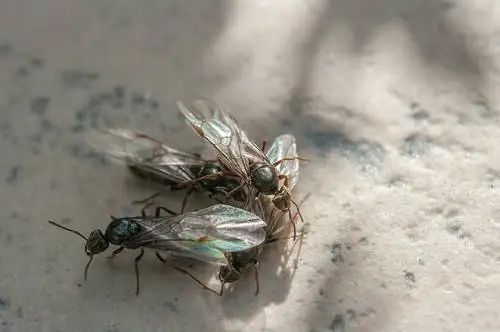
Flying ants can get lost in the house
If some nuptial birds get lost in your area, turn off the lights and open the windows completely. After a while the little animals find their way out on their own. If necessary, you can also help with shooing movements.
Frequently asked questions
Why is it better not to use insecticides against ants?
Insecticides and other chemical pesticides are poisons that have no place in the house and garden. Even if the toxins used are not dangerous for humans, they still harm the environment - for example by getting into groundwater - and have a fatal effect on more than just pests. Biocides do not differentiate between pests and beneficial organisms, but simply kill everything.
I have red ants in the garden, what kind are they?
If you live near the forest, it could be the red wood ant, a protected species that is also very useful in the garden. You should not bother them or kill them, the animals are threatened with extinction.
Can I also fight the ants with garden lime?
Dusting the ant trails and the nest with garden lime or algae lime has also proven useful in the fight against creepy crawlies.
Tip
Ants by no means stay close to the ground, but rather climb up buildings along the house walls. They do this when they smell a particularly valuable source of food - so even in an apartment on the upper floors you are not immune to all invasions.

